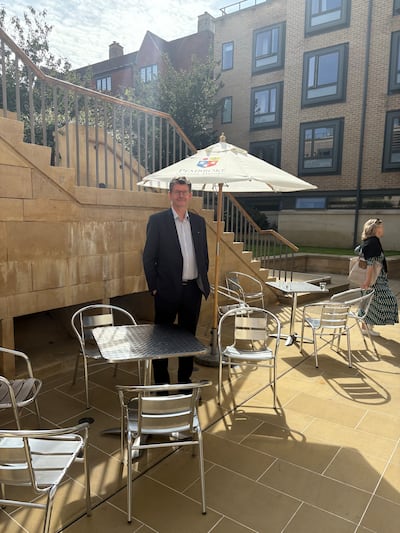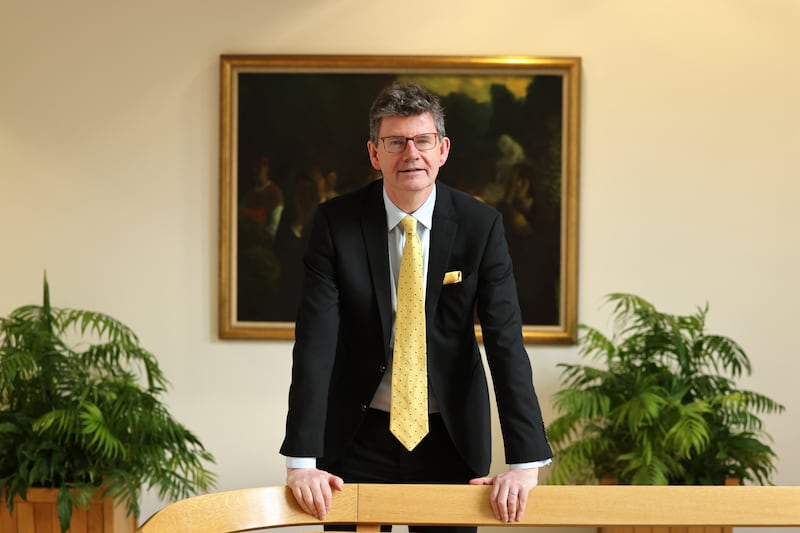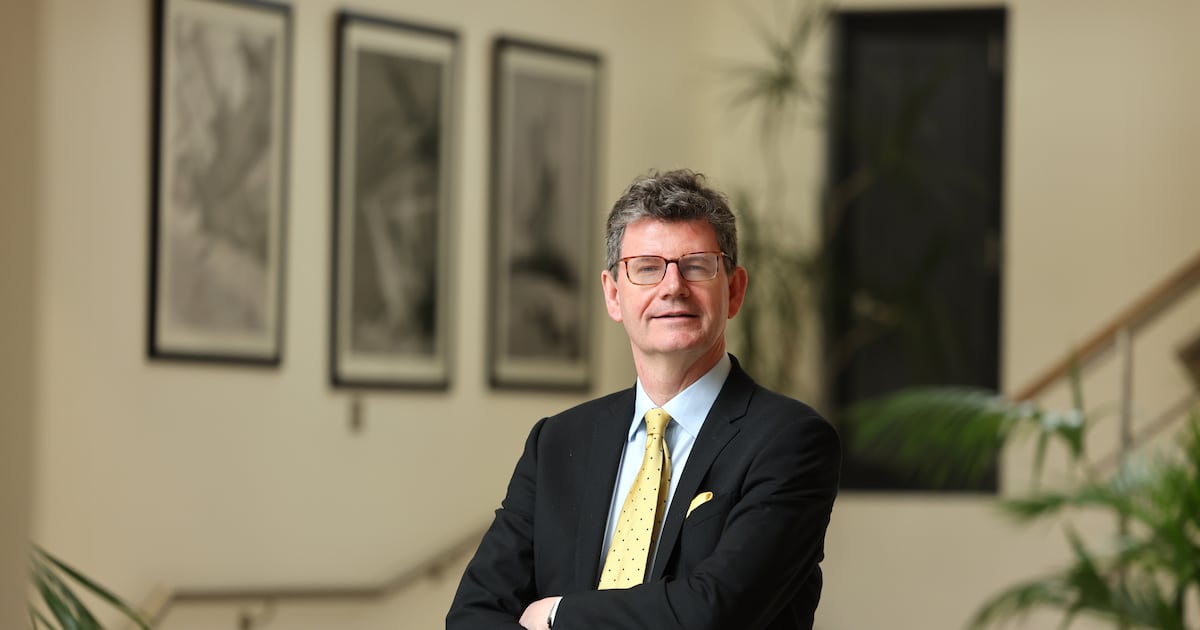Sitting in the quad of an Oxford college, Paul Johnston, the outgoing British ambassador to Ireland who leaves his post in less than a fortnight, talks about “here”, though he refers not to the English university town but to Ireland.
Like others who spend their lives involved in the British-Irish relationship – politicians, officials, community leaders, churchmen, journalists – Johnston was in Oxford at the weekend for the annual British-Irish Association gathering.
Johnston’s use of the word “here” to describe Ireland, even though he was 500km away in Pembroke College in Oxford, illustrates the depth of connection he and his wife Nicola have made with Ireland.
Unusually, the two are staying on in Ireland once his ambassadorship ends. He is becoming the director general of the Irish Universities Association – the representative body for Ireland’s seven universities – taking over from Jim Miley.
Borrowing the words of Ernest Hemingway, the decision not to leave came “gradually and then suddenly”, starting two years ago as he began to think, as ambassadors have to, about the next posting.
“It was really driven by the thought that we had found somewhere where – to paraphrase Harry in When Harry Met Sally – where we wanted to spend the rest of our lives,” he tells The Irish Times.
“We’d have really been heartbroken at saying goodbye to Ireland,” he says.
 Paul Johnston seen at the British-Irish Association meeting at the weekend in Pembroke College, Oxford
Paul Johnston seen at the British-Irish Association meeting at the weekend in Pembroke College, Oxford
It is a relationship he has invested in; he stayed overnight in 23 of the counties during his term “with hopes of finishing off the list” soon.
Five years in Dublin, Johnston began his Irish tour during the height of the Covid pandemic, getting to know his new country and its people from endless Zoom meetings rather than the usual round of face-to-face encounters.
During his time, he developed a subtle understanding of Ireland, illustrated by the laughter provoked in a speech in July to the British-Irish Chamber of Commerce in the Mansion House in Dublin when he displayed his understanding of the phrase “to give out”.
It is one found nowhere else in the English language, though it formed a not insignificant part of the early chapters of his post when relations between Dublin and London were at their lowest during the British crisis.
“I heard the phrase, and I thought this obviously means something a bit different from what it sounds like. It’s not about donation,” he says, with a laugh.
“I suffered a lot of ‘giving out’ in the first two-and-a-bit years on the job, or probably four years.”
Often, the “giving out” was done by Micheál Martin, Leo Varadkar, Simon Coveney or Paschal Donohoe, he remembers, about London’s conduct during the Brexit negotiations, even if they always avoided attacking the man.
So how bad were the bad days?
“It was bad. I remember the then Taoiseach Micheál Martin said that the relationship was at an all-time low. I thought: ‘This is a pretty bad place to be in’,” he says.
“But, you know, as a professional, you try and do your job and try and explain and defend as well as possible. But it wasn’t easy. But in a funny sort of way, it was a really good challenge because I was trying to explain and defend something that was universally unpopular here.”
“One of the many things I’ve loved about Ireland and the people I’ve dealt with is that even when the relationship between the two governments was really difficult, there was always a distinction made between the messenger and the message.”
In addition to visiting everywhere he could, Johnston maintained a visible presence on social media, though he took a break from social media network X in 2023 after taking considerable abuse following comments on Ireland’s debate about future security.
However, the social media experience brought good days, too, especially one Christmas when he posted “a nice picture from the residence in Glencairn” on December 26th, wishing his readers a “Happy Saint Stephen’s Day”, rather than Boxing Day.
 Paul Johnston: ‘I think there’s a lot of underlying affection for Britain.’
Paul Johnston: ‘I think there’s a lot of underlying affection for Britain.’
Photograph: Dara Mac Dónaill/ The Irish Times
“I got thousands, literally thousands of retweets with people saying: ‘You really understand Ireland. You have gone native’,” says Johnston, who usually quietly but firmly points out that he is Scottish, not English.
“I think the Scottishness has helped. I remember that a lot of my Irish friends were saddened when Keir Starmer came here for the Irish-English football international, and some of the Irish fans booed: ‘God Save the Queen’,” he says.
[ Is Britain headed for prime minister Nigel Farage?Opens in new window ]
“But I said: ‘You know, if England were playing Scotland in Hampden, probably a lot of Scots would be booing God Save the Queen.’ So, you shouldn’t think of it as an exclusively Irish-English thing.
“I think there’s a lot of underlying affection for Britain. A lot of people here felt very sad about the Brexit decision for all sorts of reasons, political reasons but all sorts of personal reasons too.”
He believes there’s a lot of underlying warmth too noting that many people in Ireland have “spontaneously” said to him that they are glad Dublin and London are getting on better since Keir Starmer became British prime minister.
Ambassadors have a responsibility to translate their posting for their own political masters. Johnston says James Cleverly, the Conservative who was UK foreign secretary from 2022 to 2023 encouraged his ambassadors “to go native”.
This “at first seemed like a strange thing to say”, says Johnston.
He wanted British ambassadors “to be inside the heads of your hosts” to be able to say how the Irish or French or anyone else would see any of the issues affecting relationships between capitals.
During his sometimes difficult relations with Dublin ministers, Mr Johnston says he “took from the British script the elements that I thought would make the best and most coherent case to make here”.
Throughout his time in Dublin, Johnston was struck by Irish people’s depth of knowledge of Britain, which stood in comparison to the basic if benign attitudes towards Ireland held by the majority of the British.
“Irish people are so interested in British politics. I remember having dinner with Leo Varadkar once and there was a by-election coming up in Somerset and Frome, or somewhere,” he says.
“I was vaguely aware it was happening, but Leo had all the percentages in his head. He’d been looking at the polls in the way that British people obsess about American politics.”
Later this month, the Johnstons will make their final house move, they hope, when they move out of the Glencairn residence on the Murphystown Road in South Dublin to a house elsewhere in the capital bought a year ago.
[ Irish and British futures are codependent and entangledOpens in new window ]
He will not miss the moves having completed postings in France, Sweden and Belgium in his diplomatic career.
“It’s the one bit of the job that I really dislike, uprooting every three or four years. You don’t lose your friends because you can stay in touch, but it’s never – it’s never the same. You have to start making friendships all over again,” he says.
Being a private citizen will bring its own changes.
“I’m still trying to prepare myself for it in my head. The former British foreign secretary Malcolm Rifkind once said to me: ‘You know that you’re an ex-minister when you get in the back of a car and nothing happens’,” he says.
“I suspect I’ll need to get used to not just walking to the front door and the car being there and instead getting the times for the DART or whatever but I’m looking forward to having a bit more freedom.”

